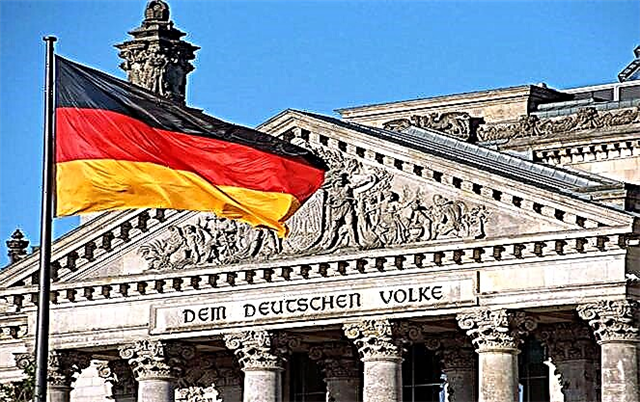When we are going on a trip to a new country, we are primarily interested in its history and main attractions. But if you are planning to move for a long time or forever, then you need to understand how all spheres of life in the country are arranged. Life in Germany is of particular interest, since this successful country has a highly developed economy and is the leader in Europe in many positions.

Living standards in Germany
In the UN ranking, Germany occupies the top lines in many indicators, such as education level, GDP size, human development index, and the rule of law index.
Such important indicators as the level of per capita income and life expectancy also allow Germany to be included in the list of the most prosperous countries in the world.
The German authorities are able to ensure the so-called minimum standard of living, which includes medical care and housing, clothing and food, protection of rights and safety.
This is the unshakable foundations of the socially oriented economy of the country - a guarantee that any citizen of Germany will receive this minimum, even persons living without citizenship on its territory.
The size of wages: what does it depend on
The stability of earnings, the size of income and its growth in the future are the main criteria, a careful analysis of which determines the decision to move to Germany: it is important to understand what you can count on when you find yourself in this country. Average salaries in Germany are significantly higher than in many other countries. And this argument is the main one when choosing a country of the European Union that is safe for living.
The size of the salary depends on many factors: profession (how much it is in demand), education, work experience and qualifications of a specialist, field of activity and industry.
The regional component is also taken into account - the federal state of Germany, on which the work is to be performed. Women, albeit excellent specialists, earn on average slightly less than men - their colleagues.
According to statistics, the average gross salary (before taxes) is determined at 3703 euros, and the average net salary (after paying all taxes) is 2225 euros. Although these figures are very relative. In each specific company, the level of income may also differ.
The maximum salary can be up to 10,000-15,000 euros. As a rule, holders of scarce specialties and employees of the highest level of qualifications, especially in medicine, can apply for such payment.
The wage minimum introduced in Germany on January 1, 2021 is today 8.84 euros per hour.
Earnings below this rate are earned by interns and students, underage wage laborers without a profession, and volunteers.
What you need to know about taxes
Taxes in Germany are capable of providing almost 70% of budget revenues: this is one of the main means of influencing the German state on the progressive development of the economy. At the same time, the country has a rather complex and ramified system of tax collection, numbering about 45 different fees.
Both German citizens and persons living on its territory for more than 180 days a year - tax residents - receive monthly written notices from the tax authorities by mail. Business beginners often need help filling out their first tax returns. Therefore, expats sometimes turn to experts: tax consultants, financial inspectors or auditors who help to understand the nuances.

The country has adopted a progressive taxation scale. Six categories of taxpayer classes define different levels of tax collection and a list of social services. Each class is directly dependent on the level of salary, marital status, the presence of children and even the state of health of the taxpayer.
The maximum tax rates are for high-income Germans, and the first class is the minimum rates for people in difficult financial situations.
The maximum income tax is 45% and the minimum levy is 14%.
The size of tax deductions increases not only in accordance with the level of income, but also takes into account the degree of regional prosperity. Thus, at the expense of high taxes for residents of Bavaria and other economically developed states, the German government provides subsidies for less developed members of the federation, such as Saxony.
Social protection in Germany
A competent tax system allows the German government to provide funding for many social programs and guarantees sustainable economic growth.
Of the amounts earned in Germany, in addition to income tax, must be paid to the country's budget:
- medical insurance premium (14.6%);
- pension contribution (18.7%);
- insurance premium for unemployment (3%);
- insurance premium in case of need for care (2.55%).
At the expense of the employer, the main part of the contributions is paid, and a smaller part of the employee's income is paid.
Social security in Germany is considered one of the most effective among the countries of the European Union. And this is also a good reason for choosing this state for emigration.
The main types of social security are pensions, benefits, compensation and subsidies. Working citizens, repaying contributions for various types of insurance, have every reason to further enjoy social privileges:
- About 90% of the country's inhabitants use medical insurance, which covers considerable expenses for a doctor's consultation, diagnostics, and inpatient treatment. You can also count on medical treatment for disabilities.
- Unemployed people who previously paid unemployment contributions can benefit from insurance.
- Pension insurance provides a completely decent standard of living at the end of the working period: 70% of the average income of a citizen who has paid pension contributions throughout his working life will begin to receive funds from the age of 65.
- Accident insurance entitles you to provide treatment in the event of an injury (if the employer pays premiums, the insurance covers the cost of injuries sustained at work or on the way to and from work). You can count on the payment of insurance in the event of serious health complications and as coverage of the costs associated with burial.
In Germany, you can receive different types of benefits, here are just a few of them:
- social benefits for the elderly;
- help for children;
- student support (scholarships, loans);
- subsidies for rental housing;
- benefits to the unemployed and family members;
- assistance to refugees.
The amounts of benefits are paid depending on the social status and age of the recipient, and the specific circumstances of their life are also taken into account.
But in any case, these subsidies are designed to meet the most basic needs of people: food, necessary clothing, medical treatment, shelter and involvement in social and cultural community life.
German medicine is one of the best
The state finances the health care system and creates favorable conditions for the successful development of scientific potential, the production of modern medical equipment, and the introduction of new pharmacological developments. Medicine in Germany is recognized as one of the best not only in Europe, but also in the world.

Many foreign citizens come here to undergo examination and treatment. Diagnostics in Germany is accurate, treatment methods are modern, medications are effective, and clinics, rehabilitation and diagnostic centers are well equipped with the latest equipment and expensive technology.
Not only large centers, but also small German cities can boast of high quality medical services. Everywhere you can find cordiality, warmth and smiles of the nursing staff.
Health insurance is a prerequisite for all German citizens. Most of the population is included in the state program of compulsory medical insurance (almost 87%). Other citizens - entrepreneurs, civil servants and persons with an annual income of over 50,000 euros - benefit from private health insurance.
Every German resident is eligible and can obtain additional health insurance from a private insurance company. It should be noted that basic medical insurance does not include dental services, so you will have to pay extra for the work of a dentist.
How much life in Germany costs
It is not entirely fair to assess the standard of living in Germany only by the amount of earnings. It is very important to anticipate and be able to calculate the level of all costs that will have to be incurred while living in the country. Although it should be emphasized right away that the cost of living depends directly on the specific lifestyle.
If we take the average figures for the country, then monthly a family of two will approximately spend:
- 650 € - for renting an apartment in a residential area of the city (with a hall and one bedroom);
- 90 € - to pay for utilities;
- 30 € - to pay for the Internet;
- 60 € - for mobile (or telephone) communication;
- 150 € - for the payment of the annual tax
- 600 € - for meals (per two);
The total amount is obtained within 1580 € per month. To this must be added the cost of car insurance and the cost of the travel ticket. These payments are calculated depending on the region (land).
A family of 3 (with one child) should expect an average monthly minimum of € 2,250.
In metropolitan areas, the cost of living is much higher than in cities in the German province. For example, in Erfurt and even in Dresden, it is cheaper not only to rent the housing itself, but also to all services that provide a certain level of comfortable life. And in Munich, Cologne, Hamburg, Stuttgart and some other West German cities, living is more expensive due to high housing prices. But there are also advantages: in these cities, it is more likely to find a job with a decent income.
For comparison, you can also cite the cost of utility bills for an apartment of two rooms in Berlin: about 200 € will cost the cost of gas, electricity and household waste disposal. And the average cost of a communal apartment in the country can be 4-5 € per square meter.
All utilities in Germany can be roughly divided into 3 groups:
- payment for the services of a private management company responsible for the maintenance and repair of residential buildings (60-100 € on average);
- payment once a year for directly rendered services: heating, water, gas, garbage disposal (prepayment according to previous indicators of last year, plus adjustment according to meter data);
- contributions to the home office for overhaul, maintenance and repair of elevators, improvement of playgrounds near the house.
The largest expense item is considered to be housing rent in Germany. Its size varies depending on the place of residence and the size of the housing area: a small apartment in a provincial town can cost 300 €, and a mansion in the central part of Munich can cost several thousand euros.
The average cost of renting a three- or four-room apartment in most parts of Germany will cost between 700 and 1000 €.
When planning to rent a house, you must take into account that it is customary to pay a security deposit (rent for 1-2 months).
Even well-to-do foreigners sometimes refuse the opportunity to purchase their own housing: in this case, they lose the right to receive social benefits. But the Germans themselves, except for those who live in villages, are in no hurry to acquire their own apartments and houses, but prefer rented housing. And such - almost 60% of the indigenous people.
Food prices in Germany
Where to buy groceries and at what price? This is the first question that can be asked by foreigners arriving in Germany for the first time. The answer is pretty predictable: in supermarkets. It is here that a huge range of products is concentrated, and they are cheaper than in food markets (unlike some southern European countries).
The supermarket chain is large: it can be both small city stores and huge hypermarkets in suburban areas. The price level is also different. Hypermarkets Globus, Kaufland or Real have rather high price tags, but you can buy everything that is useful on the farm here. Rewe and Edeka are supermarkets that can also be classified in the high price category.
More affordable prices in discounter supermarkets: Plus, Aldi, Penny and Lidl. Let's compare the cost of one kilogram of potatoes: in Rewe - 2.5 €, and in Lidl - 1.5 €.
To have a rough idea of the cost of groceries in stores, food in cafes and restaurants, consider the prices in Berlin for groceries. The table shows the average prices in stores:
| Product name | Average price (€) |
|---|---|
| White bread (500 g) | 1,23 |
| Milk (1 liter) | 0,69 |
| Eggs (pack - 12 pieces) | 1,83 |
| Chicken breast (1 kg) | 6,61 |
| Potatoes (1 kg) | 1,27 |
| Tomatoes (1 kg) | 2,22 |
| Onions (1 kg) | 1,18 |
| Apples (1 kg) | 1,92 |
| Oranges (1 kg) | 2,21 |
| Bananas (1 kg) | 1,63 |
Average prices in Berlin cafes and restaurants:
| a cafe | a restaurant | |
|---|---|---|
| breakfast | 5 € | 8 € |
| dinner | 10 € | 16 € |
| dinner | 20 € | 28 € |
Traditional and highly popular German sausages and sausages are sold all over the streets of Germany. Currywurst is especially in demand - for only 2 € per serving. Asian and Turkish cuisine helps students out: for 2-4 € you can have a good snack.
For the poor, there are special shops Tafel, where the distribution of free food is organized. Sometimes a token admission fee is required in some places. And the status of the poor must be confirmed by showing a certificate issued by a social authority.
Fare
A German car owner can be happy that his car is of high quality and the roads in the country are excellent. But at the same time, you can forget about saving on transportation costs: owning a car is an expensive pleasure. Therefore, public transport in Germany is always held in high esteem: a more reliable, accurate and high-quality transport system is difficult to find throughout Europe.
All types of transport function perfectly: city trains, buses and trolleybuses, trams and metro.
The cost of a single ticket depends on the number of trips and transfers, as well as on the region: one of the most expensive passes is in the Munich city system, and a Berlin single ticket will cost less.
On average, one-way travel for a short distance costs 4 € (according to the system "one ticket - one zone").
Taxi rides do not imply uniform fares, so the cost in different cities varies significantly: from 0.9 € in Brandenburg to 3 € in Bavarian cities. The average price is 1.5 €.
About the German mentality
As in the life of many peoples, the Germans carefully and respectfully preserve their customs and traditions. From an early age, children are taught to go to bed after 7 pm, after listening to the Sandmann program (an analogue of our "Good night, kids"). Keeping a lifelong habit of going to bed early and getting up early, Germans consider it inappropriate to call anyone after 9pm.
In Germany, they take care of their home very reverently: they are happy to decorate children's rooms, while they involve children in family traditions to create many things with their own hands. This is how ordinary people live, considering their home the only place where they can feel comfortable and completely relax.

If children are left under the supervision of grandparents, then it is considered quite logical for young parents to pay the older generation for this “part-time job”. Some Germans resettle their children after 14 years old, and sometimes they are not even interested in how they live on their own. Many immigrants in Germany do not understand this, since they are accustomed to “babysitting” their children right up to marriage or marriage.
It should be noted that the Germans are considered one of the most law-abiding nations. It is possible that this is due to the fear of receiving severe penalties and high fines for any offense, even a small one.
But one way or another, the Germans are trying very strictly to comply with the laws established in the country and the generally accepted rules of conduct in the FRG. Those who intend to come to Germany need to know about these rules.
It has long been known about German punctuality: they can be late for a meeting only for very good reasons. Therefore, if the meeting time is agreed in advance, it is necessary to arrive on time, otherwise the Germans will consider it disrespectful.
As for government agencies, they all work only during the hours allotted by certain rules, and the reception of the population is carried out only at the specified time.
It is not customary to bother people with phone calls or unexpected visits on weekends, when Germans prefer to be with their families: they do not like it when outsiders violate the boundaries of their personal space.
The culture of behavior of the Germans is also expressed in their restraint: in public they try not to express violent emotions. But they can express well-deserved criticism right in the face: straightforwardness is also characteristic of them.
At the pedestrian crossing, the Germans will always wait for the green light and will never cross even a deserted street into a red one. And when moving on your favorite transport - a bicycle, you will never turn off a special cycle path. And they will not walk on it either, even if there is not a single bicycle in the whole district.
The Germans are distinguished by politeness and decency, love of cleanliness and order. And these are not just the positive qualities of the nation, but the integral features of the German society striving for excellence.
By observing etiquette, Germans show great respect for their national traditions. This is a very good example, and many people have a lot to learn from them.
But they are not boring at all. This can be seen if you go to one of the carnivals in Germany, when the Ordnung (German order) does not seem to exist: the Germans are having fun, participating in dressing up, portraying various characters.
Some holidays in Germany are well known to foreigners, especially Oktoberfest. The beer festival has been held in Munich since time immemorial, and to this day remains one of the most ambitious and beloved not only by the Germans themselves, but also by tourists. Today it is considered a nationwide holiday.
All Christian holidays are revered by the Germans: Christmas, Easter, Trinity (Pfingsten) - they like to celebrate these and many other holidays with their family. Fasching, a carnival on the eve of Lent, is cheerfully celebrated.
Where and how do Russians live in Germany
If we call all Russian-speaking migrants Russians, including immigrants from the former CIS countries, regardless of nationality and origin, then their total number in Germany is approaching four million people.
The largest communities are concentrated in the quarters of large German cities - Berlin, Dresden, Dusseldorf, Hamburg, Stuttgart. Quite a few Russians can be found in Karlsruhe, in the federal state of Baden-Württemberg. They live compactly, social services, hospitals and shops are working for them. By the way, Karlsruhe has a twin city in the south of Russia - Krasnodar - the capital of the hospitable Kuban.
Adaptation in the country takes place in different ways, depending on the purpose of the migrant and his knowledge of the language. For some, it will take only a year or two to get used to the new living conditions, while for others, to feel at home, ten years is not enough.
Members of the Russian-speaking diaspora come to the rescue, helping immigrants who have recently arrived in Germany to integrate into a new environment for them, providing financial and informational support.
It should be noted that for Germans, the main criterion for treating a person, including a migrant, is a clear fulfillment of his labor duties and impeccable observance of all laws.
The German authorities are quite active in supporting the activities of the Russian diaspora related to cultural exchange events, tours of Russian theaters and exhibitions from Russia. And in general, favorable conditions are being created for the preservation and development of the Russian national society and the identity of migrants.
Frequently asked questions about life in Germany
The main question that interests all immigrants, without exception: is it really only German that people speak in Germany and how can the language barrier be overcome?
The Germans believe that their language is not only the most beautiful in the world, but also the most logical. They simply adore him and when they say, evaluating the speech of a newcomer, that he speaks like a real German, then you can be sure that this is an excellent compliment for an immigrant. Realizing that the language is quite complex, Germans tend to be polite in oral speech.
Overcoming the language barrier is a daunting task for migrants. Even successfully passing the obligatory test exam does not guarantee that they will be able to speak German and understand Germans in any situation: after all, the literary language taught in different courses is very different from spoken German.
Therefore, the best way to understand all the subtleties and learn the features of a language, which also has many dialects, is direct communication in practice, in the "field" conditions. A great way is to spend leisure time with the Germans.
How to spend leisure time in Germany
The Germans not only work well, but also know how to relax effectively. Leisure in Germany is excellently organized, as it is an important part of the life of society.

For a joint pastime, Germans like to unite in groups. Interest clubs - Verein - are extremely popular in Germany: sports, music, national, philosophical, international, bird lovers' clubs, such as pigeons. In the shooting clubs (Trachtenvereine), the tradition of national costumes is preserved.
The Germans are distinguished by a passion for travel: they may well win the championship in the list of the most active tourists.
Among foreign countries, they often prefer exotic places - away from civilization, where you can retire and enjoy nature.
They are also interested in the art of peoples, so Germans can often be found in famous museums of different countries. By all means, a photo report with all the details will be compiled about each trip.
How people live in a German village
Almost every modern village in Germany is the same small town with all the hallmarks of civilization: schools, shops, pharmacies and hobby clubs. In some villages, many old but well-reconstructed houses have survived. And today the facades of village frame houses with beams and braces look very picturesque thanks to the half-timbered structures (Fachwerk). As a rule, the houses are two-story.
One would think that poor people live in the villages, but this is unfair: most often the Germans own this property, and the price ranges from 200 to 400 thousand €. In the city you can buy an apartment even cheaper. The Germans do not like to flaunt their wealth: at the village houses there are simple cars, usually small cars. Fences are nowhere to be seen, and why?
The villages are absolutely clean and orderly. All streets are asphalted, on the plots there are lawns and flower beds.
The high standard of living of the villagers is confirmed by the fact that you will not see abandoned or pretty shabby houses on any of the streets - everything is just in perfect condition.
Rural life proceeds in a measured way, after sunset it completely dies down. There is little entertainment and work is also tight. Therefore, young people prefer cities.
But some people prefer to live in ecologically clean and picturesque villages, and to go to work in the city: the beautiful roads in any part of Germany quite allow this. This kind of life is also suitable for those who work remotely - after all, the Internet is everywhere.
German cuisine and food preferences
There is a myth that the Germans prefer only sausages, sausages, cabbage and potato salad in their food. But in reality, German cuisine is varied and offers a huge number of delicious dishes. Today, Germans try not to spend a lot of time preparing food and more often use semi-finished products. You can buy everything in shops, and in restaurants you can taste delicious dishes.

- A very common dish is Schnitzel - a pork or turkey chop in bread crumbs.
- French fries (pommes frietes) are a side dish that is served anytime, anywhere. Germans love steaks, like all meat eaters.
- Grillteller - a plate of grilled pieces of meat garnished with lettuce leaves - who wouldn't?
- Currywurst - the name speaks for itself: sausages (sausages) with curry sauce. Gourmets distinguish: curry for white sausage, and ketchup for red sausage.
- In Bavaria, the rich Pichelsteiner Eintopf soup is very common, made from various types of meat (pork, beef and lamb) and seasoned with vegetables: potatoes, carrots, leeks and parsley.
- Of the meat, baked with a piece of pork - Sauerbraten - is also very popular, as well as beef meat rolls with a spicy filling of onions and pickled cucumbers.
- The traditional German dish Kohlrouladen - like cabbage rolls in Russia - is also among the favorite foods.
- And in Germany, they love asparagus very much and know many recipes from this vegetable.
The Germans are not only meat eaters, but also a sweet tooth: the list of their favorite sweets can be very long.
What do Germans prefer for breakfast?
It must be admitted that the Germans love hearty and tasty food, including for breakfast. Of course, the main morning meal is sandwiches, but they are very different. Fresh pastries with marmeladenbrot are sure to be served with strong coffee or orange juice for a family breakfast. Other ingredients of the sandwich are already to your taste: cheese, salami, smoked ham - each family has its own preferences. But jam, marmalade is a must.
Germans love bread very much. In Germany, a huge number of its varieties: they are baked not only from wheat and rye flour, but also from potato and even carrot flour with the addition of various seeds that are very healthy for health: pumpkin seeds, sesame seeds, poppy seeds, caraway seeds. Almost every bun or pretzel has its own name.
Summing up
Is it good to live in Germany? Let's summarize the obvious advantages:
- high level of education, life in general, service in all public spheres;
- excellent medicine,
- relatively low food prices
- obedience to law and public order
- good conditions for professional and personal fulfillment.
The disadvantages include the difficult immigration process, the high cost of many services, the difficulty in finding a job with high earnings without the proper level of knowledge of the German language; peculiarities of the mentality of the Germans and their excessive self-confidence.
To be consistent with the hardworking Germans, you will have to work very hard. Thus, life in Germany is both attractive and discipline at the same time.











